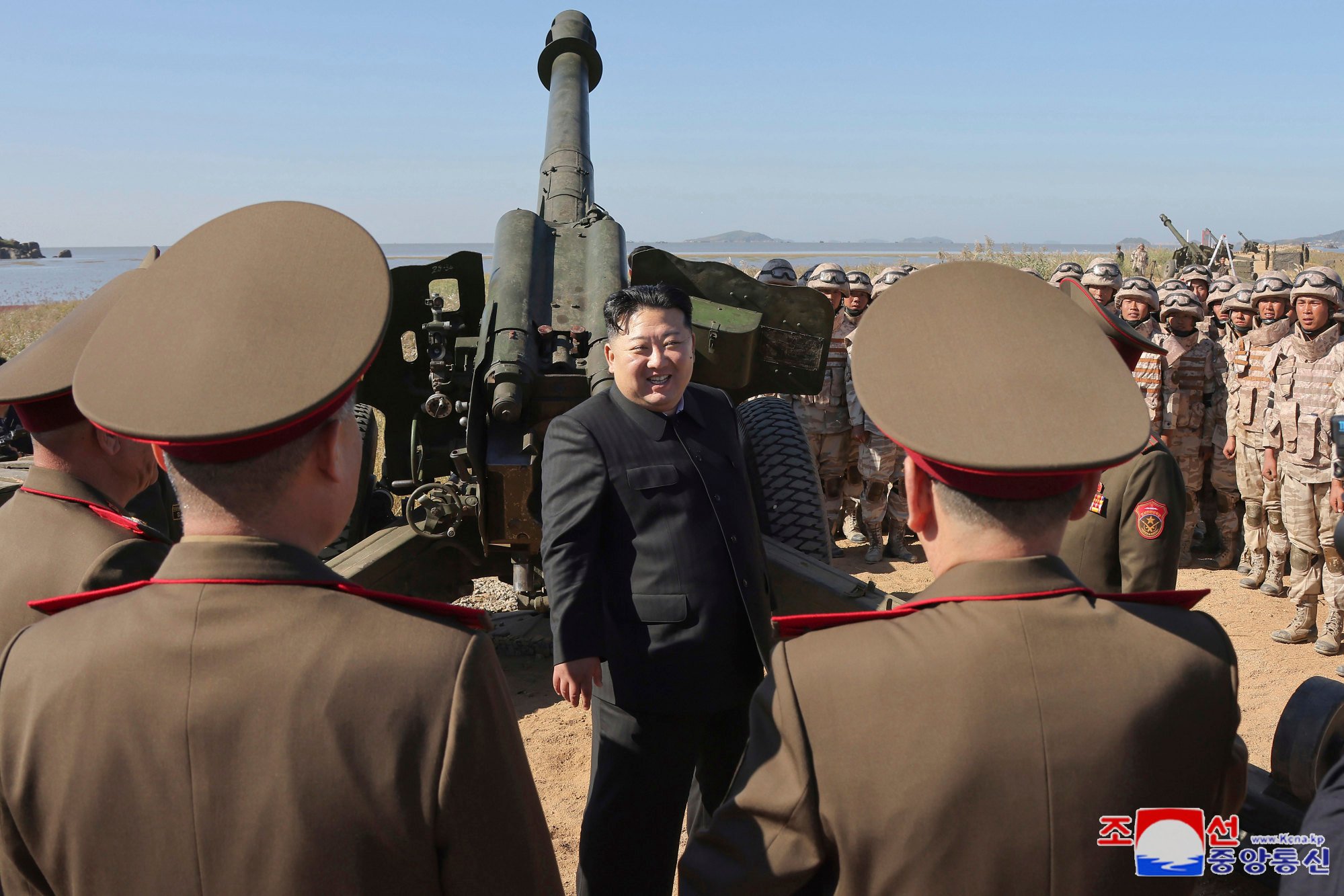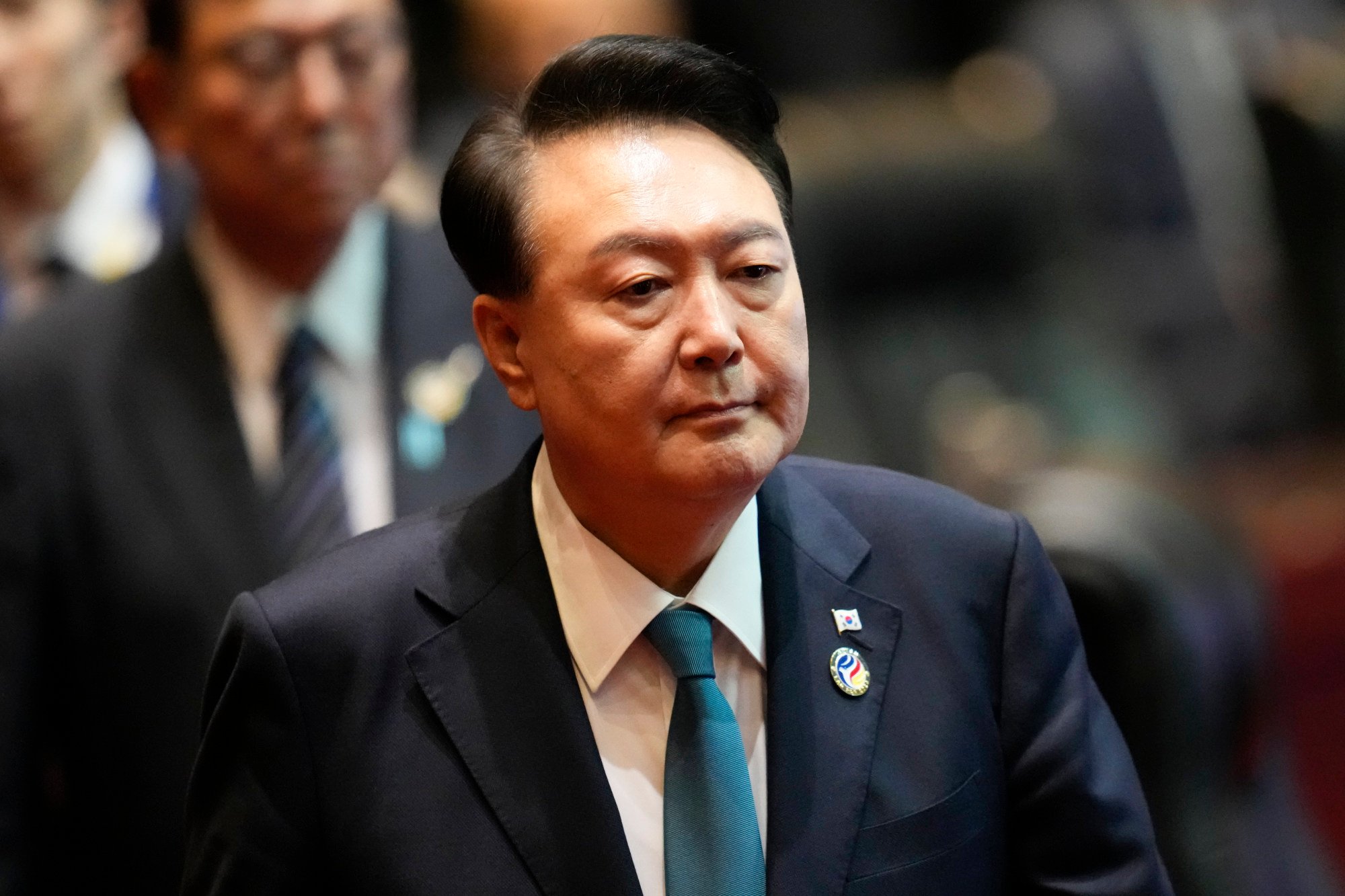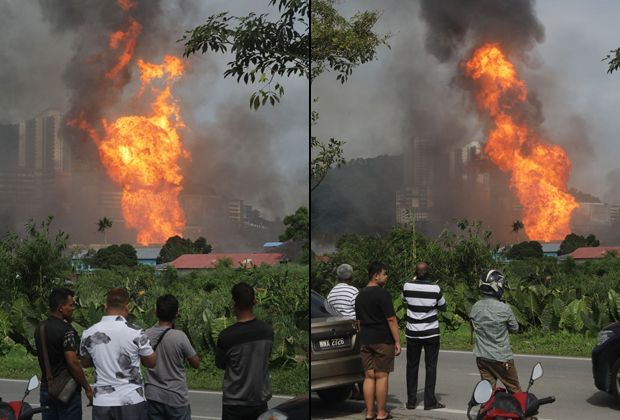
Kim Heung-kyu is a professor of political science and diplomacy and director of the US-China Policy Institute at Ajou University in Suwon, South Korea. He is also founder and president of the Plaza Project, a bipartisan think tank affiliated with the Korean National Assembly, and was a policy adviser for the South Korean presidential office. This interview first appeared in SCMP Plus. For other interviews in the Open Questions series, click here.
How do you assess the Korean peninsula situation as North Korea continues to advance its nuclear and missile programme, with no denuclearisation negotiations either with the United States or South Korea for more than five years?
North Korea had tried to improve its relationship with the United States through [former US President Donald] Trump in order to resolve its security issues, but this ended in failure. With the Hanoi summit [in 2019] as a starting point, Kim Jong-un seems to have completely made up his mind that it is impossible to solve North Korea’s security problem through negotiations or any improvement in relations with the US.
The only thing that can be done is self-help. To ensure that none of the great powers can harm North Korea’s sovereignty and interests, it needs a certain means – nuclear missiles. Thus it succeeded by pouring all of North Korea’s power and energy into it.
I think North Korea is a country that early on defined the strategic competition between the US and China as a new cold war and, in a way, welcomed the advent of US-China strategic competition. If it becomes a new cold war, there will be no choice but to decide whether you are an ally or an enemy, and if that happens, North Korea will benefit from the South Korea-US-Japan versus North Korea-China-Russia structure.
Who would even dare to attack North Korea with nuclear weapons and missiles? The US does not want that, and South Korea cannot do it either. From a security point of view, North Korea is completely safe now.
The great powers that can support the energy and economic aid that Pyongyang needs or contain any abuse of sanctions on North Korea are either Russia or China. Pyongyang has been quite successful in that the structure of the new cold war has become fairly comfortable for itself. The only problem is that the relationship with China is not as smooth as expected, and there is a contradicting aspect of China’s interest with North Korea.
Both South and North Korea are pursuing strategies to escalate the conflict. The Yoon [Suk-yeol] administration faces a crisis with low approval ratings and is attempting to increase tensions between the South and the North to reverse that situation. North Korea is also trying to resolve its people’s dissatisfaction over a long-term recession and economic crisis by stoking inter-Korean tensions.
Moreover, if the dispatch of North Korean troops to Ukraine is true, we are witnessing a catastrophe of South Korea’s northern diplomacy, which has been pursued since the previous Roh Tae-woo administration.
North Korea has defined the current situation as a new cold war, and although South Korea has not reached that stage, it is actually implementing a new cold war-like perception and foreign policy. Concerns are growing that the Korean peninsula is approaching its worst military conflict since the Korean war.
How do you assess Kim Jong-un’s leadership since the border lockdown with China in 2020 when the pandemic started? Is Kim becoming more difficult to handle through diplomatic means?
We seem to be underestimating the leadership of Kim Jong-un, [Russian President Vladimir] Putin, [Chinese President] Xi Jinping, and even [former Japanese prime minister Shinzo] Abe. When we analyse from a Western perspective, it appears that the crisis of succession or leadership that exists in any authoritarian or dictatorship system has been emphasised and led to a relatively negative image.
However, if you look at the history of each country, whether it is Kim, Putin or Xi, they have all shown great leadership. As soon as Kim Jong-un rose to power, he purged all the pro-China factions and succeeded in eliminating forces that could pose a threat to him, such as [his uncle] Jang Song-thaek, thereby achieving a certain level of domestic stability. Then he established a nuclear missile capability, building up North Korea’s leverage. By dramatically strengthening relations with Russia, North Korea obtained the energy, minerals and military high technology that it needs. Kim is the one that achieved all of these three enormous goals.
Of course, some economic difficulties cannot be resolved now due to sanctions and especially difficult relations with China, but despite this, I think systemic stability has been greatly strengthened.

How do you think China would see the recent arms exchange and closer ties between North Korea and Russia? There is a view that this is a “marriage of convenience” that Beijing is unhappy about – what is your take on this?
I fundamentally agree, because China does not want to be recognised or treated as a country like Russia or North Korea. Firstly, China is dealing with a much bigger vision and a long-term strategy. Secondly, China does not want the Northeast Asia region to fall into a new cold war. So there is a belief that it is not in China’s interests to be stuck in a structure of South Korea-US-Japan versus North Korea-China-Russia. Thirdly, I think China has already started to move forward with a much larger global strategy and vision, where the importance of traditional security in Northeast Asia has relatively decreased.
China is in a position where it does not want Northeast Asia or the Korean peninsula to become a variable or obstacle to China’s grand strategy or global strategy. There is a difference from North Korea’s strategy, which is much more focused on the Korean peninsula.
How do you see progress on communication between the US and China over North Korea? Do you expect their differences to widen in coming years?
First of all, the US wanted to place as much responsibility as possible for the North Korea issue on China, which has the most influence over Pyongyang. This was not such a bad thing for China either, because it was an important issue in maintaining the relationship between the US and China and Beijing could provide what Washington needed – managing North Korea issues. Thus, China has taken on that role and hosted the six-party talks, but the problem now is that all dreams and hopes have been shattered.
This is because, from the US perspective, China does not really do much, and China does not see a need to help the US in managing North Korea as we are in an era of strategic competition. Also, now the US itself has lower interest in North Korea. If you look at the platforms of the Democratic and Republican parties, the content on denuclearisation is completely omitted.
In fact, it started to become a “forgotten” space for both the US and China. However, from South and North Korean perspectives, it actually has to become a growing concern to have a higher chance that they can use it to gain political support or economic benefit. In that sense, it is not a very good situation.
So there will be less interest on the issue going forward?
Yes, because interest is gradually decreasing. North Korea, nevertheless, already has support from Russia and nuclear missiles. It is possible that North Korea will strengthen provocations in order to increase attention.
And because the current Yoon Suk-yeol administration in South Korea pursues peace through force and it is necessary to unite domestic conservative supporters, it will respond more strongly. So it may escalate into a spiral of tension and conflict.

In the face of North Korean threats there have been calls in South Korea for Seoul to have nuclear weapons. What’s your view on this?
Surprisingly, 60 to 70 per cent of South Korean citizens support possession of nuclear weapons, while the intellectual community had relatively very low support and was negative about the possibility of possessing nuclear weapons. This is because possessing nuclear weapons is against the so-called non-proliferation regime of the five permanent members of the United Nations – an important system that guarantees the interests of the permanent members.
If South Korea possesses nuclear weapons, the non-proliferation regime will collapse, and Seoul will have to endure strong sanctions. Here, the country imposing the harshest sanctions will be the US, just like during the [former South Korean president] Park Chung-hee days [when Seoul attempted to develop nuclear weapons in the 1970s].
However, the problem with South Korea is that, unlike North Korea, it is a so-called trading country. Trade accounts for almost 80 to 90 per cent of South Korea’s GDP. South Korea is also a country without resources. North Korea has resources on its own and can endure [sanctions], but Seoul has almost no resources to do so. This means it cannot withstand sanctions.
Therefore, while this is still only latent, the US variable is important for now. Depending on how the US behaves, South Korea’s choices and support for nuclear armament may change. Some experts are suggesting joint nuclear armament between South Korea and Japan, and the discussion has become much more serious than before, with even conservative supporters taking a positive stance on such proposals – although there is still an “if” factor. In the end, distrust in the US-ROK alliance is becoming the catalyst for South Korea’s nuclear armament.
There has been more military cooperation between South Korea, the US and Japan against North Korean threats, but it also shows Seoul’s foreign policy alignment with Washington. How do you think South Korea would view any future contingencies in the Taiwan Strait and South China Sea if the trilateral military cooperation continues?
For now, the consistent message South Korea is sending to the US is that its most important contribution to the South Korea-US-Japan security cooperation system is suppressing North Korea’s provocations, instead of engaging in any direct military intervention [in the Taiwan Strait or South China Sea]. Of course, based on the ROK-US alliance, it may be permissible to accept wounded personnel, provide repairs or general goods, but military participation in any actual military hostilities against China is beyond the scope of the ROK-US alliance. This is still the general perception in South Korea.
Moreover, an important variable in military cooperation between South Korea, the US and Japan will probably be the next South Korean presidential election. If the [opposing] Democratic Party wins or a candidate with a different political stance emerges from the ruling party, it will not be easy to continue to push for military and security cooperation between South Korea, the US and Japan. This is because the public’s feelings towards Japan are still not resolved, and Tokyo is not taking active measures to resolve any anti-Japanese sentiment among the Korean people.
So to what extent do you think the recent cooperation between South Korea and Japan will continue in the future, and do you see them achieving any breakthroughs in their historical and territorial disputes?
I believe that Yoon’s current policy towards Japan is not sustainable no matter who becomes the next president. In other words, there is no choice but to take measures to balance the historical issues and the current need for some kind of cooperation between South Korea and Japan.
Secondly, the biggest pending issue between South Korea and Japan is probably neither the North Korea issue nor the China issue, but the issue of Block 7 [South Korea-Japan Joint Development Zone] in the southern part of the Korean coast [in the East China Sea, presumed to have natural resources]. The issue will arise starting next year [as the two countries can decide whether they will extend the joint development treaty or not in June 2025], which is highly likely to lead to a huge conflict between South Korea and Japan.
If that happens, there is a possibility that South Korea-Japan relations will rapidly deteriorate. This is because Japan has no intention of making concessions, but South Korean public sentiment against the current government is too strong for South Korea to accept it as is. This will also bring enormous pressure to the next administration and a very difficult relationship between South Korea and Japan is expected.
Moving on to economic issues, there is a trend among the US and its allies to de-risk their supply chains away from China, and recent statistics suggest South Korea is gradually reducing reliance on exports to China. How do you see this playing out?
I still believe that China is the most important partner of South Korea’s economic cooperation, because it would not be in South Korea’s national interest if it decouples or widens the gap between a large market like China, a country that is still developing and leading the fourth industrial revolution.
Also, in a sense, the current structure to disperse the supply chain amid the US-China strategic competition is not only an effort to weaken the retaliation from Beijing if South Korea has too much reliance on China, but also because of changes in the economic structure. To put it simply, South Korea has nothing to sell and only things to buy. If you look closely, only exports have decreased significantly. This is also a problem with South Korea’s inability – it has become incompetent due to changes in its economic structure.
Hence, South Korea is now taking advantage of the opportunity of strategic competition between the US and China to sell goods that no longer come from China to the US. In that respect, the strategic competition between the US and China can be beneficial to the Korean economy. So there is no need to interpret the US-China strategic competition in a negative way just because of its structural nature.
How do you think Seoul sees Washington’s chip containment policy against Beijing?
Seoul wouldn’t even budge – the US considers the semiconductor field as having a direct link to its core interest in the strategic competition between the US and China and will enforce similar pressure. The patents for all of South Korea’s hi-tech products and machines to produce them are owned by the US. Will China provide them if South Korea does not bow its head to the US? South Korea makes a living out of semiconductors, so it has no choice but to succumb to pressure from the US in this field.
China is also expanding its capabilities in this field relatively quickly, so from South Korea’s perspective, this will be even more unsettling. This is because, on the one hand, South Korea has no choice but to depend on the US, and on the other hand, China is quickly catching up to South Korea’s capabilities. It will have little room to make any other choice now.
Do you think China’s recent economic softening is an opportunity or a risk for South Korea?
It is in South Korea’s best interest for China to have a moderate foreign policy and achieve rapid economic growth. Unfortunately, China’s diplomacy has become quite rigid recently with so-called Wolf Warrior diplomacy. Also, the current trend of taking economic retaliation ... is a very burdensome situation for Korea.
The decline in China’s economy is also very burdensome. This is because South Korea’s economy is largely synchronised with China’s economy. So, when China is in trouble, South Korea is also in trouble, and when the Chinese economy recovers, South Korea also recovers. Since that structure is still large, South Korea wants China to develop quickly and well.
However, the structural constraints of strategic competition have become like shackles in the field of diplomacy and security, and South Korea is not free from them. Thus, South Korea is facing a significant dilemma.
In my opinion, the most core element underlying the Yoon administration’s strong security cooperation policy with the US, and between South Korea-US-Japan, is fear. What this means is the question of South Korea being left out in this newly changing diplomatic and security structure and economic decoupling and de-risking.
China is in a situation where it has not been able to present an alternative solution. And while it is engaging in the cooperative relationship with the US and Japan, Seoul has simultaneously activated both the fear that South Korea may be internationally marginalised if the necessity of South Korean industry weakens and the impatience that it must first secure the ROK-US alliance and South Korea-US-Japan cooperation, which it can quickly visualise.
Given President Yoon’s low approval rating, to what extent do you think he will pursue a more hawkish stance on diplomacy with China?
We can fully expect that as well because the diplomatic stance of the Yoon administration ultimately comes from accepting the international political perception of the competition between democracy versus authoritarianism proposed by the Biden administration. However, the problem is, first, even the US no longer views international relations in this way.
The second thing is that there is a lot of resistance in South Korea. Although it is true that the South Korean public’s perception of China has worsened significantly since the THAAD [Terminal High Altitude Area Defence anti-missile system] incident, the majority still oppose a hostile relationship with China, according to polls. It could be a trigger that could further weaken the current approval rating of the already unpopular and weakened Yoon administration. It would be more helpful for them to make the relationship with North Korea more hostile.
You have argued that South Korea “must seek cooperation and coexistence rather than conflict” in the US-China rivalry. How can Seoul find a balance between cooperating with China and maintaining security ties with the US?
We need to move away from thinking that the current structure is simply a new cold war or a completely dichotomous one. The relationship currently being sought to be established between the US and China seems a bit far from that. Although there is fierce competition between them in core areas, there is a lot of room for cooperation in many others, such as manufacturing or emerging security-related fields. The more we zoom in on it, the better it will be.
In the case of South Korea, it can now actively cooperate with China and also with the US. In areas that the US designates as its core, South Korea does not have any leverage of its own, so it has no choice but to keep saying that it will comply with the ROK-US alliance. On the other hand, South Korea will also begin to increasingly consider security without the US in its North Korea-related policies. The arms race is inevitable, and it would be reasonable to say that South Korea’s modifications and new tactics and development of these strategies are in progress.
More from South China Morning Post:
- Economist Joseph Stiglitz on the US-China trade war and the death of ‘hyper-globalisation’
- Japan’s PM Ishiba set to focus on security ties with South Korea to counter Pyongyang
- North Korea orders border troops ‘get ready to open fire’ after drone claims
- How China and the US went from ‘90% cooperation to 90% competition’
- Japan’s leader is calling for Nato-like nuclear sharing with the US. Will it deter China?
For the latest news from the South China Morning Post download our mobile app. Copyright 2024.










































